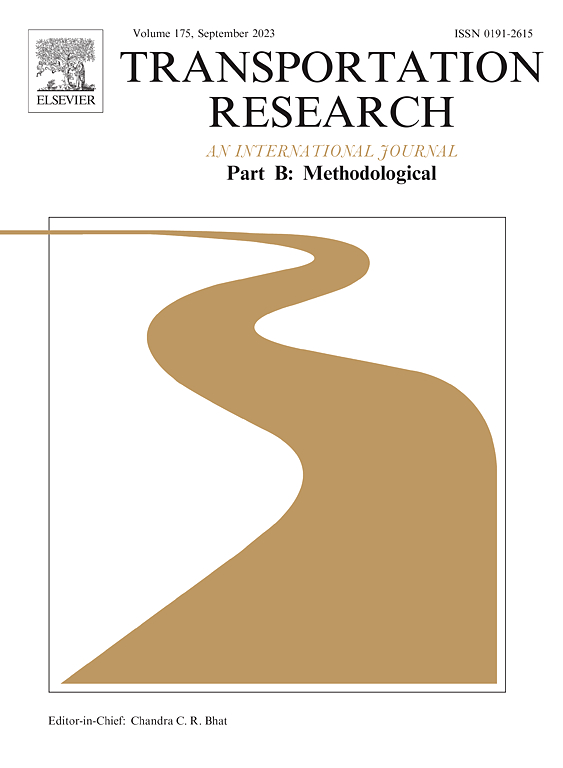多类流量分配中的熵最大化
IF 5.8
1区 工程技术
Q1 ECONOMICS
引用次数: 0
摘要
熵最大化是一种标准的方法,以一致地选择一个唯一的类特定的解决方案,为多类流量分配。在这里,我们证明了传统的最大熵公式不能严格遵守多类双准则用户平衡条件,因为匹配总平衡链接流的类特定解可能违反平衡条件。我们建议通过要求类特定解除了匹配总平衡环节流外,还匹配平衡处的目标函数值来解决这个问题。这就产生了一个新的公式,该公式使用基于对偶化硬平衡相关约束的精确算法来求解。我们的数值实验突出了最大熵解决方案的优越稳定性,因为它受输入扰动的影响远小于未经处理的基准多类分配解决方案。除了不稳定性之外,基准解决方案还表现出不同程度的随意性,可能使其不适合评估不同群体之间的分配效应,而这是在涉及垂直公平和环境正义的应用程序中至关重要的能力。所提出的公式和算法为这些缺点提供了切实可行的补救措施。本文章由计算机程序翻译,如有差异,请以英文原文为准。
Entropy maximization in multi-class traffic assignment
Entropy maximization is a standard approach to consistently selecting a unique class-specific solution for multi-class traffic assignment. Here, we show the conventional maximum entropy formulation fails to strictly observe the multi-class bi-criteria user equilibrium condition, because a class-specific solution matching the total equilibrium link flow may violate the equilibrium condition. We propose to fix the problem by requiring the class-specific solution, in addition to matching the total equilibrium link flow, also match the objective function value at the equilibrium. This leads to a new formulation that is solved using an exact algorithm based on dualizing the hard, equilibrium-related constraints. Our numerical experiments highlight the superior stability of the maximum entropy solution, in that it is affected by a perturbation in inputs much less than an untreated benchmark multi-class assignment solution. In addition to instability, the benchmark solution also exhibits varying degrees of arbitrariness, potentially rendering it unsuitable for assessing distributional effects across different groups, a capability crucial in applications concerning vertical equity and environmental justice. The proposed formulation and algorithm offer a practical remedy for these shortcomings.
求助全文
通过发布文献求助,成功后即可免费获取论文全文。
去求助
来源期刊
CiteScore
12.40
自引率
8.80%
发文量
143
审稿时长
14.1 weeks
期刊介绍:
Transportation Research: Part B publishes papers on all methodological aspects of the subject, particularly those that require mathematical analysis. The general theme of the journal is the development and solution of problems that are adequately motivated to deal with important aspects of the design and/or analysis of transportation systems. Areas covered include: traffic flow; design and analysis of transportation networks; control and scheduling; optimization; queuing theory; logistics; supply chains; development and application of statistical, econometric and mathematical models to address transportation problems; cost models; pricing and/or investment; traveler or shipper behavior; cost-benefit methodologies.

 求助内容:
求助内容: 应助结果提醒方式:
应助结果提醒方式:


